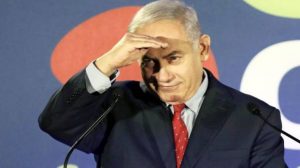 Janjivan Bureau /New Delhi : Just six months after Narendra Modi became the first Indian prime minister to visit Israel, Prime Minister Benjamin Netanyahu was scheduled to set off early on Sunday morning for a five-day reciprocal visit, underlining the strength of the relationship between the two countries that only formally established diplomatic ties 25 years ago.
Janjivan Bureau /New Delhi : Just six months after Narendra Modi became the first Indian prime minister to visit Israel, Prime Minister Benjamin Netanyahu was scheduled to set off early on Sunday morning for a five-day reciprocal visit, underlining the strength of the relationship between the two countries that only formally established diplomatic ties 25 years ago.
Netanyahu’s visit – the first by an Israeli prime minister since 2003 – comes within the framework of events to mark a quarter century of diplomatic relations. Like Modi’s visit to Israel last July, this trip will focus more on economic and technological cooperation and development than on regional issues.
Which is not to say the geopolitical issues will not be discussed – Modi is expected to visit the Palestinian Authority next month as part of a trip that will also take him to the United Arab Emirates – but this issue will not be the central part of Netanyahu’s discussions, as it so often is when he travels to other countries, particularly in Europe.
Diplomatic officials said they did not expect India’s vote against Israel on the Jerusalem issue in the UN General Assembly last month to cloud the visit, since the two countries have already clarified their positions to each other through diplomatic channels.
“The issue is behind us,” one diplomatic official said.
Israel conveyed its disappointment to New Delhi over the vote. Since 2015, however, there has been a marked change in India’s voting pattern on Israel-related issues at international forums. While in the past India could be counted on to vote against Israel, it has increasingly abstained over the last two years.
For instance, it abstained on a high-profile anti-Israel resolution in the UN Human Rights Council in 2015, which was followed two weeks later by another abstention on a vote to give UN recognition to an NGO with alleged links to Hamas.
It also abstained on two of three votes in UNESCO over the last two years either denying a Jewish link to the Temple Mount, or any Israeli sovereignty over Jerusalem.
Netanyahu will begin his visit to India by going to the Teen Murti Memorial in New Delhi honoring the Indian soldiers who fought under British Gen. Edmund Allenby and defeated Turkish forces in the 1918 Battle of Haifa. Indian mounted cavalry units captured Haifa, which was a fortified town, in a daylight cavalry charge.
He will then meet with Indian Foreign Minister Sushma Swaraj, followed by a private dinner with Modi.
On Monday, Netanyahu will be formally welcomed at the Rashtrapati Bhavan, the presidential palace, followed by a visit to a memorial to Mahatma Gandhi. The memorial marks the spot of Gandhi’s cremation.
From there Netanyahu will go to Hyderabad House, for another meeting – and a lunch – with Modi. He will then meet with India’s President Ram Nath Kovind, followed by an event with Indian and Israeli business leaders.
Representatives of some 100 top Israeli firms will be accompanying Netanyahu to India, and a number of economic round tables are scheduled during the visit.
On Tuesday, Netanyahu will go to the Taj Mahal in Agra, 250 km. south of Delhi. He will return to Delhi that night and be the keynote speaker at a symposium, which is sponsored each year by the Indian Foreign Ministry and a leading think tank. Modi will address the symposium as well.
Netanyahu will travel to Modi’s home state of Gujarat on Wednesday, to Mumbai on Thursday, and is scheduled to arrive home a few hours before Shabbat on Friday.
Netanyahu’s son Yair had been invited on the India trip, but he did not join his family Saturday night when they embarked on their trip. Last week, a secret tape was aired on Channel 2 in which the prime minister’s son, as he was driven around to Tel Aviv strip joints in a car and with a security team paid for by the state, made disparaging comments about women and boasted that his father had arranged a massive business deal for the father of one of his friends.

















